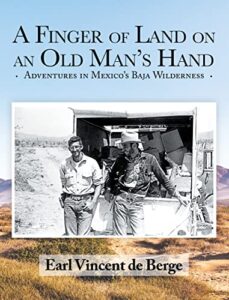
I met Earl and his wife, Suzanne, several years ago over lunch in Phoenix, discussing fundraising strategies for an NGO they set up in Guatemala, “Seeds for a Future,” which provides training to impoverished rural women on the South Coast. I soon learned that we shared a love and appreciation of Guatemala and the Desert Southwest and that Earl was also a writer and, in his case, a poet.
I was surprised to learn that he started writing as far back as 1959 and is publishing an autographical novel laced with poetry and photos about his adventures as a young man in the Sonoran deserts of Baja California, Mexico, and Arizona, A Finger of Land On An Old Man’s Hand. As a high school senior, he came across one of the best Chinese poets, Li Po, noted for his elegant romantic verse, which the author felt drawn to express to some of the various women in his life. He was soon writing about nature, the environment, cities, and social issues, and his imagination was fueled by his travels through Central America, the Sonoran Desert, and the Andes. “Everything I experience has potential for a poem—even the increasingly dreadful business of politics.”
Stories from this book take place in 1962 when de Berg and three other rebellious students set out for a three-month trek looking for adventure. Earl provides stories and photos of young men putting themselves to the test on the longest peninsula in the world. I visited the area between La Paz and San Lucas thirty years after the author. I will never forget the stunning contrast of giant Saguaros of the Sonoran Desert looking off into the Sea of Cortez.
Baja provided numerous challenges to the men and their equipment as they trekked over its mountainous, sometimes barren, desert environment. They encounter wild animals and first experience Pacific storms as oceans bracket them. The local population is not to be messed with, and they came across gold prospectors, hermits, and more than one-of-a-kind characters.
Earl provides a brief history of the area where the natives repelled the Spaniards twice, starting in 1533, And the “Mexican Revolution of 1910-20 provided “an indelible romantic tincture into Mexican culture that is powerfully expressed in folklore, art, and music.”
The adventure is broken up with many humorous sidebars, starting with, “After six months of preparation, I’m thrilled to be underway. Suddenly, Adel slams on the brakes, slaps his forebrow, and declares, ‘I forgot my single-egg fry pan!’ I curl my arm and form a fist. He laughs, grabs the steering wheel, and motions us forward like a cavalry colonel.”
Earl is an accomplished poet, which complements his powerful writing style. In his 80s, he used notes from an adventure in his 20s. His book is more than a memoir or biography; it is a series of travel adventures at their best and worthy to appear on the big screen someday.
The Author
Arizona native Earl de Berge is a writer, photographer, and poet. His education includes Antioch College (BA) and U of Arizona (MA). A political scientist, he founded the Behavior Research Center, created the respected Rocky Mountain Poll, and was Editor for 35 years.
Writing poetry since 1959, he often focuses on his fascination with the Sonoran Deserts. From his experiences in Guatemala’s post-civil war years, he draws inspiration from the environment, poverty, shadows, friendship, loneliness, hope, aging, coyotes, hawks, brigands, fools, danger, and death. And, of course, politics. Earl’s photographs, logbooks, and essays reflecting on life experiences are foundations for his prose and poetry.
Earl has recently published three collections of his poems, “Alegro to Life,” “Swans to Carry Me,” and “Wind in the Elephant Tree,” which touch on nature, human nature, love, desert silence, and life in Guatemala. He is currently assembling “The Man Who Ate His Dreams,” a biography of a rags-to-riches businessman, artist, and poet, and a collection of short desert stories for young readers.
Earl and his wife, Suzanne, split their time between Arizona and Guatemala, where they founded the nonprofit Seeds for a Future to help impoverished rural women improve their families’ access to adequate food and nutrition with home gardens and small animal protein sources.
Product details
- ASIN : B0BGBBNXP5
- Publisher : iUniverse (September 21, 2022)
- Publication date : September 21, 2022
- Language : English
- File size : 12275 KB
- Text-to-Speech : Enabled
- Screen Reader : Supported
- Enhanced typesetting : Enabled
- X-Ray : Not Enabled
- Word Wise : Enabled
- Sticky notes : On Kindle Scribe
- Print length : 912 pages
- Best Sellers Rank: #1,161,594 in Kindle Store (See Top 100 in Kindle Store)
The Reviewer
Mark Walker was a Peace Corps Volunteer in Guatemala. He spent over forty years helping disadvantaged people in the developing world with agencies like Food for the Hungry, Make-A-Wish International, and Hagar USA. His book, Different Latitudes: My Life in the Peace Corps and Beyond, was recognized by the Arizona Literary Association. His second book, My Saddest Pleasures: 50 Years on the Road, was the 2023 Peace Corps Writers’ Award for Best Travel Book winner. He’s a contributing writer for Literary Traveler, Wanderlust Journal, and The Authors’ Show. “The Million Mile Walker Review: What We’re Reading And Why” can be found in the Arizona Authors’ Association Newsletter, Authors Digest. His wife and three children were born in Guatemala. You can learn more at www.MillionMileWalker.com.